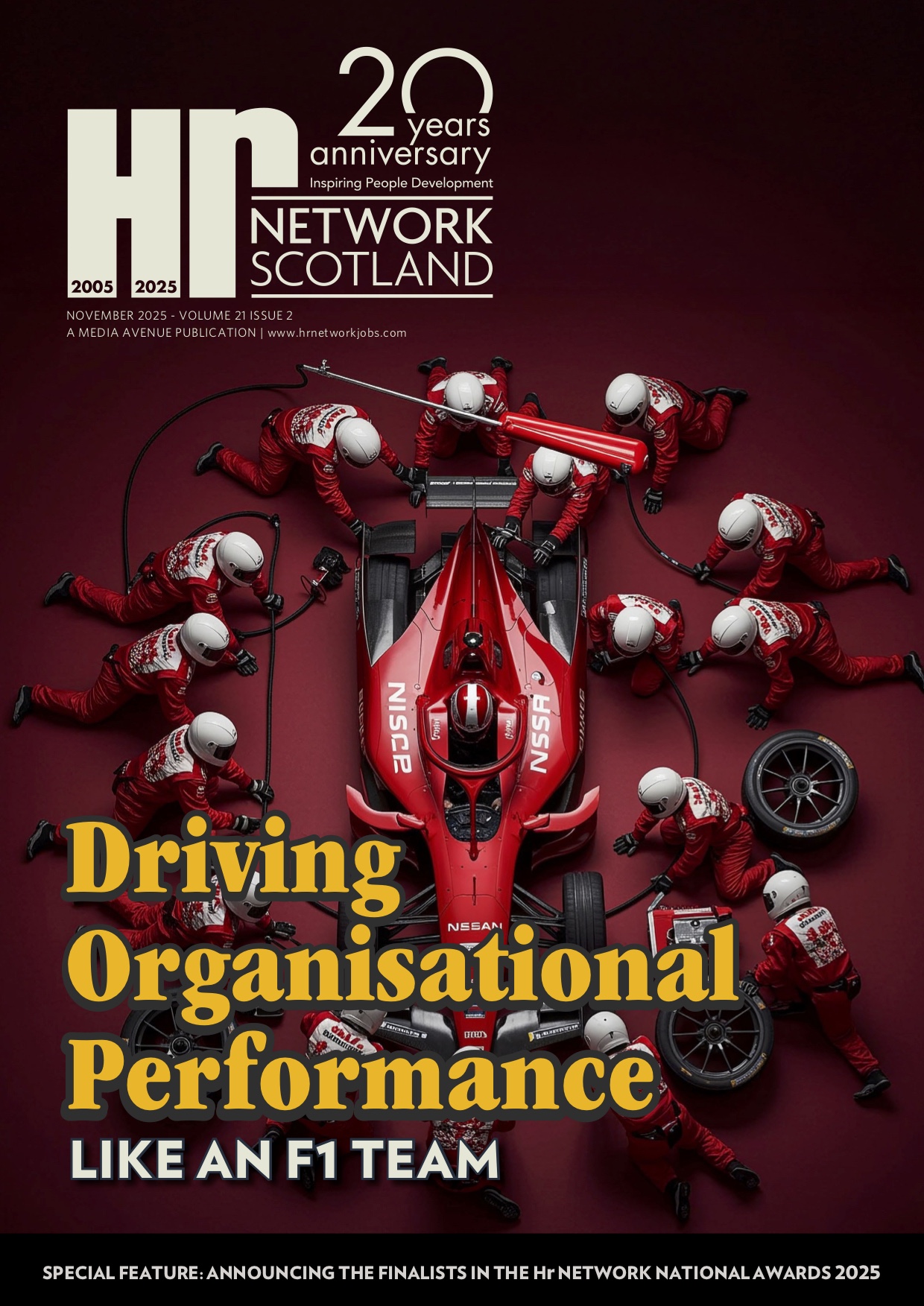Our Latest News
OUT TODAY – JANUARY 2026 Issue of Hr NETWORK Magazine
OUT TODAY – JANUARY 2026 Issue of Hr NETWORK Magazine
SIGN IN/SIGN UP TO Hr NETWORK HUB TO READ ALL OUR MAGAZINE ISSUES…
The True Colours of Transformation: Why People-Powered Technology?
Like a chameleon adapting to its environment, HR must blend technology with valued human contribution. Automation may promise efficiency and innovation, but its true power emerges when people are involved. Technology may set the pace, but people set the direction. Andy Moore examines why a human-centered approach to technology is vital in 2026 and beyond.
Also in the latest issue:
- Announcing the WINNERS for Hr NETWORK National Awards 2025 in partnership with Alvarez & Marsal
- SPECIAL FEATURE: The Role of HR in Tackling Modern Slavery
- The regular sections of the magazine include: News, STATS and EXTRA
- The ‘Insights’ section features first class comment from those in the know on a range of subjects including: whistleblowing training; Managing off-payroll risk
Click the front cover below to read the latest issue:
Hr NETWORK ‘TRANSFORMATION THROUGH PEOPLE & TECHNOLOGY’ Conference & Exhibition 2026
Hr NETWORK ‘TRANSFORMATION THROUGH PEOPLE & TECHNOLOGY’ Conference & Exhibition 2026
The Hr NETWORK National Conference & Exhibition will take place on Wednesday 13th May 2026 at the home of Scottish Rugby, the magnificent BT Murrayfield Stadium.
 Following a hugely successful Conference & Exhibition in May 2025, followed by the incredible reaction from Sponsors & Guests at our recent Hr NETWORK National Awards Gala Dinner at the Hilton Glasgow on 13th November 2025, we are delighted to announce details for the forthcoming and hugely anticipated annual Hr NETWORK’ TRANSFORMATION THROUGH PEOPLE & TECHNOLOGY ’ Conference & Exhibition 2026.
Following a hugely successful Conference & Exhibition in May 2025, followed by the incredible reaction from Sponsors & Guests at our recent Hr NETWORK National Awards Gala Dinner at the Hilton Glasgow on 13th November 2025, we are delighted to announce details for the forthcoming and hugely anticipated annual Hr NETWORK’ TRANSFORMATION THROUGH PEOPLE & TECHNOLOGY ’ Conference & Exhibition 2026.
The delegate booking form for 2026 is NOW OPEN and this is your chance to SAVE £50 on each booking made between now and Saturday 28th February 2026 – EARLY BIRD DELEGATE COST: £165+VAT
Please note when the EARLY BIRD booking expires on 28th February, the cost per delegate will increase to £215+VAT.
Younger employees driving office return as older colleagues remain reluctant to turn backs on WFH
Younger employees driving office return as older colleagues remain reluctant to turn backs on WFH
 Younger employees are more likely to embrace office working than their older colleagues, with three in ten (29%) employers admitting that under 30s are the least likely to have an issue with returning to the office. The new research by Epassi UK, the all-in-one benefits hub, as part of its Employee Benefits Report 2025, finds that a fifth (20%) of businesses say that employees under the age of 30 come into the office more frequently than required.
Younger employees are more likely to embrace office working than their older colleagues, with three in ten (29%) employers admitting that under 30s are the least likely to have an issue with returning to the office. The new research by Epassi UK, the all-in-one benefits hub, as part of its Employee Benefits Report 2025, finds that a fifth (20%) of businesses say that employees under the age of 30 come into the office more frequently than required.
Hybrid working remains one of the most in-demand perks amongst employees – nearly nine in ten (86%) say it is what they value most about their job, as it makes them feel happier, and more productive. For example, three quarters (74%) of all employees say that when they work from home, they tend to do more work as they have no commuting time.
ONS figures show that 9.5 million people in the UK were hybrid working earlier this year. However, many employers – particularly major employers in the tech, financial and legal sector – are beginning to move away from mixed working styles and instead, are mandating returns to the office.
While nine in ten (87%) employers currently allow their employees to work from home, a quarter (27%) admit they have changed their policies within the last year, requiring staff to come into the office more.
Employees are feeling this shift – half (52%) of employees say their employer has changed their attitude to working from home policies in the last year, rising to six in ten (59%) younger employees. Half (51%) feel as though their employer favours those who come into the office more often.
As a result of policy changes, a fifth (20%) of businesses have already admitted that requiring workers to be in the office more has resulted in employees quitting. This sentiment is equally reflected by employees – seven in ten (70%) workers say they’d consider leaving their current job for one that offers hybrid working if their employer changed their current working from home policy.
Younger employees are more likely to embrace office working than their older colleagues, with three in ten (29%) employers admitting that under 30s are the least likely to have an issue with returning to the office. The new research by Epassi UK, the all-in-one benefits hub, as part of its Employee Benefits Report 2025, finds that a fifth (20%) of businesses say that employees under the age of 30 come into the office more frequently than required.
Hybrid working remains one of the most in-demand perks amongst employees – nearly nine in ten (86%) say it is what they value most about their job, as it makes them feel happier, and more productive. For example, three quarters (74%) of all employees say that when they work from home, they tend to do more work as they have no commuting time.
ONS figures show that 9.5 million people in the UK were hybrid working earlier this year. However, many employers – particularly major employers in the tech, financial and legal sector – are beginning to move away from mixed working styles and instead, are mandating returns to the office.
While nine in ten (87%) employers currently allow their employees to work from home, a quarter (27%) admit they have changed their policies within the last year, requiring staff to come into the office more.
Employees are feeling this shift – half (52%) of employees say their employer has changed their attitude to working from home policies in the last year, rising to six in ten (59%) younger employees. Half (51%) feel as though their employer favours those who come into the office more often.
As a result of policy changes, a fifth (20%) of businesses have already admitted that requiring workers to be in the office more has resulted in employees quitting. This sentiment is equally reflected by employees – seven in ten (70%) workers say they’d consider leaving their current job for one that offers hybrid working if their employer changed their current working from home policy.
Celebrating the WINNERS of the Hr NETWORK National Awards 2025 in partnership with Alvarez & Marsal
Celebrating the WINNERS of the Hr NETWORK National Awards 2025 in partnership with Alvarez & Marsal

The winners of this year’s hugely exciting and much anticipated Hr NETWORK National Awards 2025 in partnership with Alvarez & Marsal were announced at the ‘star-studded’ Annual Gala Dinner, held at the hugely impressive Hilton in Glasgow on Thursday 13th November.
 Over 650 guests came along to RECOGNISE, ACKNOWLEDGE and REWARD the champions of the Scottish HR profession, at the glittering evening, which showcased the winners across 17 different categories including: Baillie Gifford (Learning & Development Award) Highland Spring (HR Team of the Year) and Weir Group who became the first organisation in the history of the Awards to be shortlisted in all six categories they entered, with wins in three including: HR Project, Organisational Development Award and Employee Engagement Award of the Year.
Over 650 guests came along to RECOGNISE, ACKNOWLEDGE and REWARD the champions of the Scottish HR profession, at the glittering evening, which showcased the winners across 17 different categories including: Baillie Gifford (Learning & Development Award) Highland Spring (HR Team of the Year) and Weir Group who became the first organisation in the history of the Awards to be shortlisted in all six categories they entered, with wins in three including: HR Project, Organisational Development Award and Employee Engagement Award of the Year.
The 18th annual gathering, which is the flagship event for HR professionals across Scotland, was hosted for the third time by radio broadcaster and Scott Wilson.
The coveted Outstanding Contribution to Scottish HR award was presented to John Ferguson for his commitment and dedication to the HR profession in a career spanning over 35 years.
A full review of the evening including all the pics and highlights from the event will be published in the next issue of Hr NETWORK Magazine and also on our Hr NETWORK Magazine Group: https://hub.hrnetworkscotland.com/communities/groups/magazine/home
Category winners of the Hr NETWORK National Awards for 2025 are:
-
HR Graduate of the Year – sponsored by Robertson Group – Winner: Alexandra Hislop, Strathclyde Business School
-
Attraction & Resourcing Award of the Year – Winner: Suntory Global Spirits
-
HR Assistant/Officer of the Year – sponsored by Skyscanner – Winner: Nicola Cunningham, University of Strathclyde
-
Employee Engagement Award of the Year, sponsored by Multrees Investor Services – Winner: Weir Group
-
ESG Award of the Year – Winner: Business Stream
-
HR Project of the Year – sponsored by CIPD – Winner: Weir Group
-
HR Manager/Advisor of the Year, sponsored by AAB – Winner: Daniel Moczynski, NWH Group
-
Health and Wellbeing Award of the Year – sponsored by International Beverage – Winner: NHS National Services Scotland
-
Organisational Development Award of the Year – Winner: Weir Group
-
Learning & Development Award of the Year – Winner: Baillie Gifford
-
Diversity & Inclusion Award – Winner: Tata Consultancy Services
-
Best Employer/Workplace of the Year, sponsored by Be Group –Winner: International Beverage
-
HR Business Partner of the Year, sponsored by Right Management – Winner: Alison Burnett, McQueens Dairies
-
HR Team of the Year – Winner: Highland Spring Group
-
Leading with Kindness Award of the Year, sponsored by Leading Kind – Winner: Suntory Global Spirits
-
HR Director of the Year sponsored by LHH – Winner: Robert Allan, McQueens Dairies
-
Outstanding Contribution to Scottish HR – John Ferguson (Retired)
ALL the Winners Pics can be found in our ‘Hr NETWORK Magazine’ Group on Hr NETWORK HUB: https://hub.hrnetworkscotland.com/communities/groups/magazine/home
Further information regarding the winners and the gala dinner, including ALL GALA DINNER photographs from the evening will be available in due course here: https://hub.hrnetworkscotland.com/communities/groups/magazine/home. Next Year’s Awards Gala Dinner will take place in Glasgow on Thursday 12th November 2026. For details regarding Nominations in 2026, Sponsorship and Table Hosting, please contact the Awards Planning Team on Tel: 0131 625 3267 or email: awards@hrnetworkscotland.co.uk
Carers Rights Day – Thursday 20th November
Carers Rights Day – Thursday 20th November

Carers Rights Day takes place on Thursday 20th November, and this year’s theme is ‘Know your rights, use your rights. By getting involved, you can help people in your organisation with caring responsibilities at home to understand their rights as carers and feel confident in using them. With just a few weeks to go, now is the perfect time to take part – share information with colleagues, raise awareness on social media, or host your own event.
Find information and resources on the Carers Rights Day webpages, including top tips for running activities and a social media guide with ready-to-use graphics and posts.
https://www.carersuk.org/news-and-campaigns/our-campaigns/carers-rights-day/
If your organisation would like to share what you’re planning or have any questions, get in touch with the Carer Positive Team at Carers Scotland.
Help support the hundreds of thousands of people who are carers in Scotland by raising awareness of the rights they are entitled to.
OUT TODAY – NOVEMBER 2025 Issue of Hr NETWORK Magazine
OUT TODAY – NOVEMBER 2025 Issue of Hr NETWORK Magazine
SIGN IN/SIGN UP TO OUR Hr NETWORK HUB TO READ ALL OUR MAGAZINE ISSUES…
Driving Organisational Performance Like an F1 Team
Driving organisational performance demands precision, agility, and alignment. Andy Moore discovers the many metaphors of Formula One success that apply to the workplace.
Also in the latest issue:
- Announcing the FINALISTS for Hr NETWORK National Awards 2025 in partnership with Alvarez & Marsal
- SPECIAL FEATURE: How To Manage World-Class Talent
- The regular sections of the magazine include: News, STATS and EXTRA
- The ‘Insights’ section features first class comment from those in the know on a range of subjects including: Managing Risk; Sentiment To Performance









